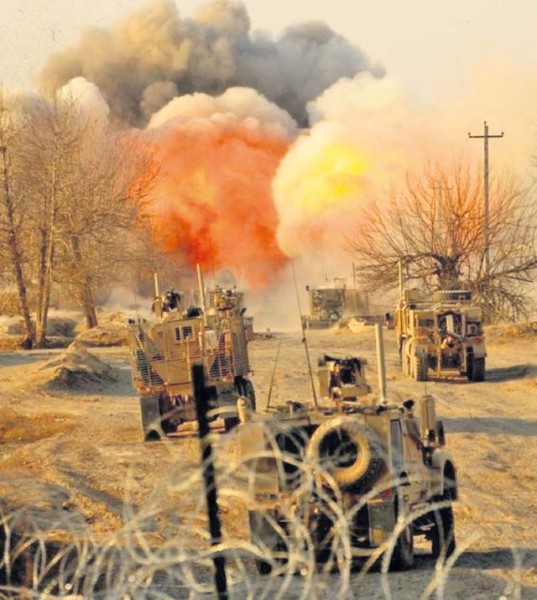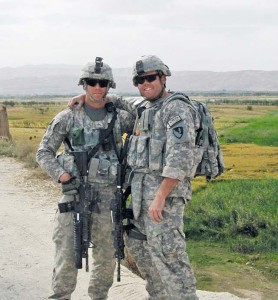
An improvised explosive device is detonated during a mine clearance by the same unit to which Sgt. Shayne Merritt was assigned on Aug. 6, 2010, when he earned the Combat Medical Badge for medical aid he rendered while under enemy fire.
Sgt. Shayne Merritt was treating a mortally wounded Afghan soldier during a long and intense firefight when he heard the shout to “get down.” The Soldiers around him stopped assisting Merritt to return fire while Merritt instinctively covered the patient with his body to prevent further injury from bullets their “whip crack” sounding nearby. Merritt continued treating and covering his patient during the ground battle until the soldier lost the struggle to survive.
For his selfless service, Merritt was awarded the Combat Medical Badge during a June 20 ceremony at Landstuhl Regional Medical Center, where the 32-year-old medic now works as the training NCO for Alpha Company.
The events leading up to that incident began the day prior on Aug. 6, 2010, when Merritt departed with the 40th Mobility Augmentation Company, 2nd Engineer Battalion, to clear a route and gain access to a village. The engineers were followed by infantry Soldiers from the 10th Mountain Division and the Afghan National Army. The mission had an ominous start as a mass exodus of local villagers marked the telltale sign of anticipated action by local insurgents.
Soon afterward, the convoy came under attack from the rear by about 40 insurgents using rocket propelled grenades and small arms fire. Meanwhile, toward the front of the convoy, one of the vehicles was struck by an improvised explosive device estimated at approximately 1,500 pounds. Merritt’s vehicle maneuvered through the maze of vehicles ahead of them during the firefight until they reached the RG-31 Medium Mine Protected Vehicle, whose entire front end had been blown away while knocking the three Soldiers inside unconscious. Merritt treated the three Soldiers who were then removed from the scene by a medevac helicopter, which also came under fire. By the end of the day, the seven-hour battle had claimed the lives of 14 Afghan soldiers while injuring five U.S. Soldiers.

After camping for the night on the route, the convoy got underway the next morning, rolled past the blast hole from the IED attack and soon encountered obstacles put in place by insurgents during the night, making the route impassable.
The acting Afghan commander, a lieutenant in his 40s, was in the lead calling out the situation and was attempting to breach a nearby compound when an RPG exploded about 5 feet from him. Fellow Soldiers carried him to Merritt, who immediately began treating him from head to toe, including applying three tourniquets and treating serious wounds to the head and chest.
Merritt described the scene as “pretty crazy” and said he could not recall how long he treated the Soldier, but that it “felt like an eternity.” The incident happened almost two years ago, but Merritt said he still thinks about that lieutenant every day and the many more like him.
Merritt has deployed to both Iraq and Afghanistan during his seven-year Army career, which has meant separation from his wife and four children. But the sacrifice has been for a job he loves.
“Being a medic is awesome. I mean, you’re ‘doc,’ you’re everything. You have your guys, and when anything is wrong with them, they expect you to know everything. Whatever the problem is — they may call you at 2 o’clock in the morning — they expect you to fix it, and when you do fix it they then become your loyal servant for the rest of their lives,” Merritt said with a smile as he discussed the special bond between Soldiers and medics.
Part of that bond is earning the moniker “Doc,” an honor not shared by all medics, Merritt said. “It’s quite an honor to get that title,” he said.
The Combat Medical Badge is an Army award created in January 1945. Any member of the Army Medical Department, at the rank of colonel or below, who is assigned or attached to a medical unit (company or smaller size) that provides medical support to a ground combat arms unit during any period in which the unit was engaged in active ground combat is eligible for the CMB. According to the award criterion, the individual must be performing medical duties while simultaneously being actively engaged by the enemy.


